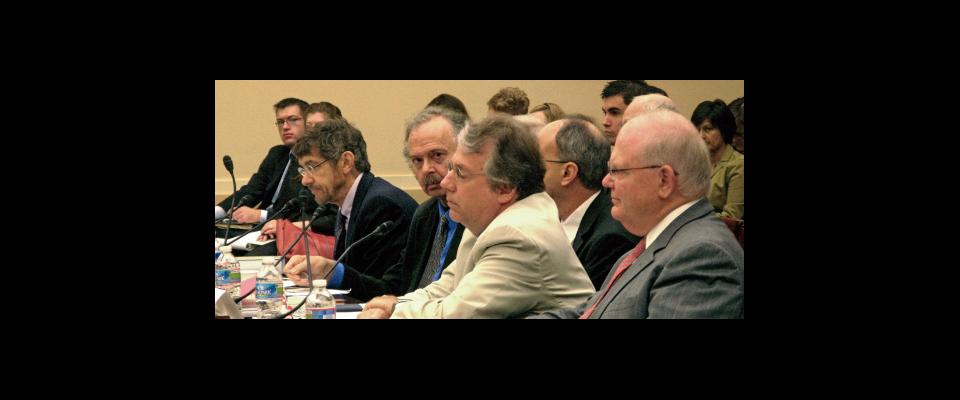A Berkeley physicist takes the temperature of climate change.
There are plenty of reasons you might have heard of Richard Muller. The longtime Lawrence Berkeley National Laboratory senior scientist has won a Macarthur Fellowship and has for many years taught Physics 10, better known as Physics for Future Presidents, publishing a popular book by that name. He has even been a talking head on Glenn Beck’s Fox News show. Now he’s working on what could be his highest-profile project to date.
Last March, Muller testified before the House science committee about research he and his daughter Elizabeth, the CEO of an energy consultancy, initiated in 2010. Called the Berkeley Earth Surface Temperature project (or Berkeley Earth), its goal is to combine and reanalyze the last two centuries’ worth of global land temperature data. The outcome, expected in the near future, is twofold: a new record of the planet’s surface temperature, and a set of data and algorithms available for public scrutiny and further analysis.
At this point, the reader may very well wonder, haven’t three major climate research groups already analyzed the planet’s temperature and found it to be on the rise? Well, yes. But if you thought the science was settled, Richard Muller would like to disagree. He points out, for example, evidence compiled by retired meteorologist (and climate change skeptic) Anthony Watts that questions the reliability of a number of temperature monitoring stations. Muller contends that such concerns have been ignored, even attacked, by climate scientists. “That kind of bothered me,” he says, “because since when are you not supposed to ask questions?”
Berkeley Earth compiles some 1.6 billion data points, collected from 39,390 stations, correcting them as needed, and converting them all into a common format. Muller compares the task to cleaning the Augean stables, and identifies the project’s lead scientist, Robert Rohde, as Hercules. Rohde, who earned his physics Ph.D. at Berkeley in 2010, describes the data as amounting to several hundred gigabytes over multiple hard drives, all coming from 16 sources in 12 different formats, each with its own quirks and tweaks. Data sharing has always been a challenge, says Berkeley professor of atmospheric science Inez Fung (who is not part of the project). “I must confess,” says Rohde, “I didn’t realize how hard it would be.”
Rohde is also developing and testing the algorithms they will use to analyze the data, with input from Muller and the project’s advisors. They hope to incorporate ocean surface temperatures soon. They’re trying to use as much of the data as possible, which will help address objections from skeptics who claim previous studies were biased because they were overly selective or glossed over data. And they’ll open all their methods for examination. Though scientists such as Fung and NASA Goddard Institute for Space Studies climate modeler Gavin Schmidt welcome the group’s new analysis, they are confident that the results will simply confirm previous temperature studies.
This expectation was reinforced by Muller’s House testimony last spring. He reported that what the team had seen so far agreed with the existing temperature studies. Furthermore, the biases highlighted by Watts did not affect the overall trend.
His announcement came as a surprise to those who assumed Muller was a global warming skeptic. Muller disputes that label, asserting he’s merely a scientist following the scientific method. He calls out the extremes on both sides of the debate, particularly the exaggerators who subvert science to an alarmist agenda, eroding the public’s trust in scientists.
In contrast, Muller vocally takes the higher ground, saying he’s only interested in good science. His attitude irks climate scientists, who interpret this as a judgment upon them. “That gets a little grating,” says NASA’s Schmidt, “and people push back against that arrogance.”
The objectivity of Berkeley Earth has also been questioned because of its funding from the Charles G. Koch Charitable Foundation (Charles being one of the billionaire Koch brothers notorious for their support of conservative causes). Elizabeth Muller counters that the Koch money, like much of their funding, was offered unsolicited, and doesn’t have any bearing on their research. Far less attention is given to the significant funds from the Department of Energy and a Bill Gates-supported foundation. But the cumulative effect of the funding questions, Muller’s outspoken personality, and his support of the work of some prominent skeptics, is like holding up a lightning rod in a thunderstorm.
Muller shrugs it off. “In the end,” he says, “judge us based on our papers. Judge us based on what we do.”
The team members caution that Muller’s testimony was based on only about 2 percent of the available data, so what Berkeley Earth ultimately concludes remains to be seen, and they’re keeping mum about the latest results. Will their findings settle the debate?
“You can’t convince everybody,” says Muller. “What we’re aiming for are the people who are, in principle, convincible.”
But he does expect that group to include politicians who’ve expressed concern about previous climate research. Which brings us back to Physics 10. When he inherited the course, it was called Physics for Poets. He renamed it Physics for Future Presidents. “When poets make a mistake it’s no big deal,” he explains. “But when a congressman makes a mistake, it has big consequences.”





















